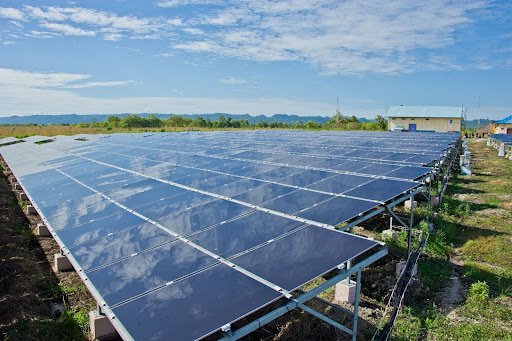UNC Diplomacy Initiative Hosts Discussion on Environmental Diplomacy
A solar panel array in Eastern Indonesia. Source for photo: Asian Development Bank.
“What is Environmental Diplomacy?” was both the title and principal question of a talk held at the FedEx center on Tuesday, February 27. In the talk, which was hosted by UNC’s Diplomacy Initiative alongside the American Academy of Diplomacy, three panelists tried to answer that question, focusing on how environmental diplomacy has shaped the recent relationship between the United States and Indonesia.
One panelist was Alonzo Fulgham, who formerly led the United States Agency for International Development (USAID). According to Fulgham, USAID plays a vital role in global environmental diplomacy because it facilitates public-private partnerships. Fulgham also emphasized how regional development banks contribute to environmental diplomacy. These organizations, of which the largest are the Asian, African, and Inter-American Development Banks, give out loans to projects that meet specific development goals, including environmental protection and fighting climate change.
Fulgham was also joined on stage by Robert Blake, a former ambassador from the United States to Indonesia. After he served as ambassador, Blake also negotiated Indonesia’s Joint Energy Transition Partnership, or JETP, alongside Special Presidential Envoy for Climate John Kerry. JETPs are deals in which developed countries agree to give financing to climate projects in developing countries, particularly ones with high usage of fossil fuels.
In Indonesia’s case, it received $10 billion worth of loans from developed-country governments, plus an additional $10 billion from private banks looking to fund clean-energy projects. In return, the Indonesian government took its own measures to accelerate its transition towards clean energy. These measures include setting more ambitious climate goals and reducing regulations impeding renewable development, such as requirements for parts of solar farms to be produced in Indonesia.
However, it was not always a smooth road for Indonesia to get its JETP. According to Blake, the deal faced resistance both within Indonesia and abroad and continues to face challenges in its execution. On the Indonesian side, coal mining is a significant economic sector with ties to many important political figures. For example, Luhur B. Pandjaitan, a crucial member of President Joko Widodo’s cabinet, is also the co-founder of a firm in the fossil fuel industry. Meanwhile, Blake said that Indonesia was skeptical of the United States’ commitment because of opposition to climate change prevention from the Republican Party.
Besides Blake, Fulgham, and Vice Provost for Global Affairs and host of the event, Barbara Stephenson, the final presenter was Anthony “Bud” Rock. Rock is a former acting Assistant Secretary of State for oceans, environment, science, technology, and health who has also worked for the National Oceanic and Atmospheric Administration (NOAA). He emphasized the importance of looking at the intersection of environmental and other issues in environmental diplomacy.
Rock says, “We’re beginning to understand that, when we work on a hazardous waste issue, it’s also a health issue and it’s also a coasts issue.”
One suggestion that Rock had is that the United States could build on current environmental diplomacy projects like the JETP with Indonesia by establishing a dedicated bureau for environmental diplomacy. Such a bureau could be particularly important in the future, as all speakers agreed that rising concern about climate change would make environmental diplomacy particularly important.
On the Indonesian side, the future seems bright but uncertain. Although the JETP has been agreed to and is now being implemented, a deal between the United States and Indonesia on critical minerals is still wanting. Indonesia is a major producer of nickel and many other metals. Still, its role in the global supply chain has raised concern because many firms in its mining industry are based in China and significant environmental and health problems are associated with communities where nickel mines are placed.
This all showed that environmental diplomacy is more complex than just doing diplomacy about the environment. The panelists advocated for a view that it is its own subfield of diplomacy, with particular influence from environmental science and the study of climate change. All in all, the talk showed how environmental diplomacy was not just a theoretical construct but an active practice, particularly in Indonesia.

